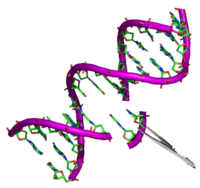
Photo from wikipedia
β-Thalassemias are inherited anemias that are caused by the absent or insufficient production of the β chain of hemoglobin. Here we report 6–8-year follow-up of four adult patients with transfusion-dependent… Click to show full abstract
β-Thalassemias are inherited anemias that are caused by the absent or insufficient production of the β chain of hemoglobin. Here we report 6–8-year follow-up of four adult patients with transfusion-dependent β-thalassemia who were infused with autologous CD34 + cells transduced with the TNS9.3.55 lentiviral globin vector after reduced-intensity conditioning (RIC) in a phase 1 clinical trial ( NCT01639690) . Patients were monitored for insertional mutagenesis and the generation of a replication-competent lentivirus (safety and tolerability of the infusion product after RIC—primary endpoint) and engraftment of genetically modified autologous CD34 + cells, expression of the transduced β-globin gene and post-transplant transfusion requirements (efficacy—secondary endpoint). No unexpected safety issues occurred during conditioning and cell product infusion. Hematopoietic gene marking was very stable but low, reducing transfusion requirements in two patients, albeit not achieving transfusion independence. Our findings suggest that non-myeloablative conditioning can achieve durable stem cell engraftment but underscore a minimum CD34 + cell transduction requirement for effective therapy. Moderate clonal expansions were associated with integrations near cancer-related genes, suggestive of non-erythroid activity of globin vectors in stem/progenitor cells. These correlative findings highlight the necessity of cautiously monitoring patients harboring globin vectors. A gene therapy phase 1 trial in patients with β-thalassemia shows transplantation of autologous CD34 + cells transduced with a lentiviral globin vector after reduced-intensity conditioning achieves long-term engraftment, albeit not transfusion independence, with benign clonal expansions, warranting cautious monitoring of patients.
Journal Title: Nature Medicine
Year Published: 2022
Link to full text (if available)
Share on Social Media: Sign Up to like & get
recommendations!